Taking Shakespeare’s Measure in the Twenty-First Century
Dr. Nora Williams and Measure (Still) for Measure
Shakespeare’s Measure for Measure has long had a reputation as a “problem play.” Structurally, it’s a comedy, but because its plot goes to some dark places, some of its characters’ actions are utterly repugnant, and its thematic concerns are so serious, its ostensibly happy ending doesn’t leave audiences feeling satisfied.
Rather than shy away from Measure for Measure and its uncomfortable elements, Dr. Nora Williams is using them to further discussions about sexual consent, rape culture, and power. Her devised theatre project, Measure (Still) for Measure, invites participants to revise the original play in order to focus on these themes. She joined us to talk about the play and how she’s using the devising process to find ways to make it speak to our present-day concerns.
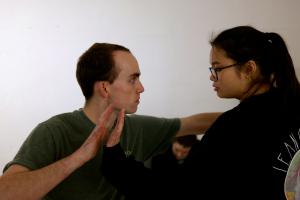
Links:
- Visit Measure (Still) for Measure’s website.
- Connect with Nora on her Twitter page.
Additional Reading:
- Nora has compiled an extensive reading list at her project’s website, which you can find here.
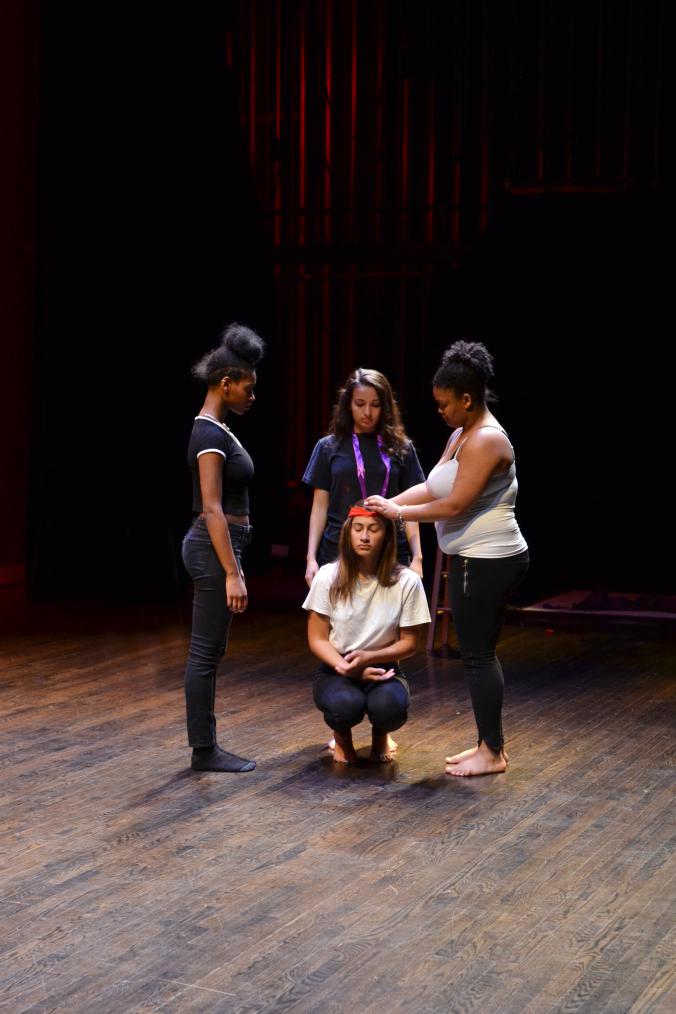
You can subscribe to this series via Apple iTunes, Google Play Music, or RSS Feed or just click on the link below to listen:
Transcript:
Michael Lueger: The Theatre History Podcast is supported by HowlRound, a free and open platform for theatre makers worldwide. It's available on iTunes, Google Play, and howlround.com.
Hi, and welcome to the Theatre History Podcast. I'm Mike Lueger. Many of William Shakespeare's plays pose problems for those of us who want to stage them in the twenty-first century. People in Shakespeare's era thought very differently about matters such as sex and gender; however, some artists and scholars, such as today's guest, are embracing the difficult aspects of Shakespeare's plays using them as the basis for explorations of contemporary issues.
Our guest for this episode is Dr. Nora Williams. She holds a PhD in drama from the University of Exeter, and she's the creator of Measure (Still) for Measure, a practice as research project that involves reimagining Measure for Measure as a way of instigating discussions about matters such as rape culture, sexual assault, and consent. Nora, thank you so much for joining us.
Nora Williams: Thank you so much for having me, Mike. I'm thrilled to be here.
Michael: For those of us who maybe haven't read the play in a while, can you refresh our memories about Measure for Measure and maybe also explain what it is about this play that speaks to our present moment?
Nora: Sure. Measure for Measure is one of those plays that isn't taught in schools very often and isn't performed very often partly because it's considered a problem play. Traditionally, in Shakespeare scholarship, that means that it doesn't fit neatly into a genre category. It's not really a comedy. It's not really a tragedy. We can't pin down exactly what it is. We hear people talk about Shakespeare's plays all the time saying that they're still relevant today, and people say that like it's a good thing.
I think with Measure for Measure and other plays we can name, a fellow comes to mind right away. It's not necessarily a good thing that they're still relevant. There are issues in these plays that we really should've resolved sometime in the last 400 years that we haven't figured out yet. In Measure for Measure, that issue I think is about power and toxic masculinity and female bodily autonomy and women's right to choose in any number of ways and the issues around sex and gender and consent very clear particularly in the scenes between Isabella and Angelo.
The plot of the play, or the main plot of the play, is that Claudio is engaged to a woman named Juliet. They're not married yet. Juliet becomes pregnant, as happens. At the same time, the Duke of Vienna, where they all live, abdicates his position. He decides he's going to take a break. In his place, he appoints a deputy named Angelo who starts enforcing a lot of laws that have been on the books for a long time but weren't being enforced. Among them is a law against fornication, which is any sex outside of marriage.
Claudio is one of the first people to be arrested under this new enforcement, and he is put in prison and sentence to basically immediate execution. He's going to die as a result of getting his fiancée pregnant. Claudio's friend goes to Claudio's sister Isabella, who is about to take her vows as a nun and says to her, "We've tried everything else. We need you to go and plead your brother's case before Angelo, the deputy."
She goes, and she pleads his case, and she says, "Yes, I don't think this is good. I'm about to be a nun, but you have to take account of difference, and you have to put yourself in Claudio's shoes. You must have sinned in your life. You must have felt what he is feeling," and if you can't, kind of don't throw stones at a glass house, whatever that proverb is. She essentially runs rhetorical circles around him. It's a fabulous scene where she really has the upper hand. She leaves that scene with Angelo saying, "Well, I'll think about it. Come back tomorrow."
When she comes back Angelo says to her, "Look. Here's the deal. If you have sex with me, I'll let your brother go. Cool." Her reaction is pretty much what you'd guess. She's like, "A, I'm a nun. No. B, ew. No. C, hypocrite much?" They have a lot of back and forth, and eventually, Angelo says to her, "Look. The thing is, either you have sex with me, or not only will I execute your brother, I will also torture him first."
Pretty clear consent issue here and not just the power differential, but also obviously a coercive element there. The play continues to unfold with everybody trying to figure out how to get out of this. Claudio's trying to figure out how to not die, and he actually says to his sister, "Well, maybe you should just do this for me because I'm going to die, and what's your immortal soul in the face of death?" which she obviously is not convinced by, being a nun.
The duke, meanwhile, has disguised himself as a friar and gets himself involved, and there's all kinds of complicated back and forth with a bed trick and a head trick. At the end of the play, Claudio does not die. The duke reveals himself to not actually be a friar and promptly promises marriage to Isabella who does not respond, does not get a line in response.
Again, I think it's clear particularly in the Weinstein moment that we're living in right now, how this play's relevant, but I think it's also important to say that it has been relevant for all of the same reasons around consent and sexual assault for a long time.
I've been working on this project for about three years, and when I started, it was Emma Sulkowicz at Columbia who was in the news carrying her mattress. At every point that I've been working on it in the last three years, there's been a name that immediately comes to mind, or a case that immediately comes to mind that people are thinking of when we work on it.
Michael: I'm struck by your saying that, yes, it's still relevant, but for all the wrong reasons. Relevant isn't a good thing in this case. I'm curious about how your project relates to the cult of Shakespeare and what you gained from adapting the original play in this way.
Nora: It's a question that I get a lot about this project. If you want to talk about contemporary women, if you want to work on something that speaks to the contemporary moment, why use Shakespeare? Why not come up with a new play? Why not just dive into some straight devising because there's a strong devising component to this project?
My answer usually is that Shakespeare is such a cult figure, as you say. It has cultural capital, has such a hold over still twenty-first century culture in so many ways that actually taking Shakespeare down a peg by adapting Shakespeare and saying, "Well, this is how you told the story 400 years ago, but this is not how we would tell the same story in the present," that has a kind of disruptive power, and so we can capitalize on the power that Shakespeare has culturally in order to get people in the order, and then also manipulate Shakespeare a little bit and show people that, "Look, Shakespeare can only tell us one side of a story, can only tell us one version of a story." If we actually take the same story, and in most cases with this project, even the exact same words, and change the perspective on them, I think we get at something really powerful in terms of disrupting a narrative, disrupting a patriarchal hegemonic way of thinking about the world.
Michael: Without getting too deep into the weeds of textual analysis here, it's my understanding that calling Measure for Measure Shakespeare's play maybe isn't even entirely accurate?
Nora: Yeah. There's a fairly strong scholarly consensus at this point. I would say that Thomas Middleton, who's another playwright from the same period, had some kind of hand in probably editing Measure for Measure after Shakespeare's death. Certainly the version that we have in the folio has a couple of passages that particularly John Jowett and Gary Taylor have argued convincingly are not by Shakespeare and are mostly likely by Thomas Middleton.
Michael: This play has been, in a sense, rewritten since the beginning. Now, I'm curious about what you're doing with it today. When and where did this project start, and how did it initially develop?
Nora: The project started totally by accident. I was on a research trip in Austin, Texas, and I was at home at my apartment after spending the day in the library watching a livestream of Cheek by Jowl's Russian language production of Measure for Measure. This would've been in 2015. It was, as I said, in Russian but with English surtitles. In another window on my laptop, I had opened an article about Emma Sulkowicz, who I mentioned earlier, and you probably remember her mostly for the very iconic images of her carrying her mattress around Columbia University. I was reading about Emma's experience and watching Measure for Measure, and we got to the scene where Angelo presents this ultimatum to Isabella. She has a line in that scene that really slapped me across the face in that moment watching it and reading about Emma at the same time.
She says, "To whom should I complain? Did I tell this, who would believe me?" It was like a physical reaction, like a gut-punch slap in the face kind of moment of, oh, her language is so close to Emma Sulkowicz's language. I just, I felt very, very strongly in that moment that these two women would have something to say to each other and felt very powerfully the real injustice of not having changed anything much in 400 years, that these two women, centuries apart, could sound so similar, could have exactly the same question in mind.
It bugged me enough that I kept thinking of it. One of my good friends said to me after I had been ranting about it to her, she's like, "Well, make some theatre about this." I said, "Oh. Yeah, I could do that. Yeah. That'll work." When I got back to Exeter where I was still a PhD student at the time, I gathered up a bunch of my friends who were professional or semi-professional actors in the area, and we booked out a studio, and just started experimenting.
Michael: This began in Exeter, but you brought Measure (Still) for Measure all the way from the UK to the Nichols School in Buffalo, New York. Can you tell us about how the project evolved and what that experience in Buffalo was like?
Nora: Sure. I'm a graduate of Nichols School in Buffalo. I'm an alum, and I've remained very close with the theatre teacher there, Kristen Tripp Kelley. She's phenomenal. I mean, she's still one of the people whose opinion I trust the most and who I really count as a friend and a mentor. In, it would've been Christmas 2015, I guess, I was in Buffalo visiting for the holidays. We went out for coffee together, and I told her about this thing that I had been working on. It was like, "I don't even know if it's any good. I don't know where it's going," but at that point, we'd been offered a little bit of funding to do a research and development week at The Bike Shed Theatre in Exeter with the ragtag group of actors that I've gathered there.
She was really excited by the project, and we had been looking for an opportunity to collaborate for a long time. She said, "What do you think if we bring it to Nichols, if we do it with my ... " She has an advanced acting class that's all high school seniors, and they do a, usually, some kind of devised piece in the second half of the year. She said, "What do you think? If it goes well, if you get what you want out of it, and you think it would work, why don't we talk about doing this with my seniors next year?" That's how that got started.
The research and development week did go really well. We got where we wanted to be with that. Kristen and I agreed that I would work with my team to try and send her a draft script by September of 2016 to start working with her students in the new academic year.
Michael: Now, I understand that this is really an international project now. Started in the UK, came to Buffalo, and I understand, recently, you also brought it up to Canada.
Nora: Yeah. I went up to Dalhousie University in Halifax at the invitation of Professor Dave Nicol who I understand who has also been on the podcast to do some Measure for Measure work with his drama dramaturgy students. The way that the funding worked out for me to go there, we ended up opening the workshop to the public. We had members of the Villain's Theatre, which is a group that does Renaissance drama that isn't by Shakespeare, basically, in Halifax. That was really cool. They have a mix of students and professional actors in the room. I feel like it was a really good productive week.
Michael: Now, which each of these workshops, I'm curious about what kind of the creative process is like. What is everyone getting together to do? How are you working with the text and turning it into something different?
Nora: It's a little bit different every time, and that's the point is that whatever group of people we have in the room, I really wanted the project to always reflect the people who we were working on it, so not to be something that was really static and rigid, but to be flexible enough to reflect the priorities of the room. As I said, every time I've worked on it, there's been a different scandal, a different name, a different case that has been on people's minds.
Certainly, last year when we were at Nichols, we started rehearsals about two weeks before Trump's inauguration, so there was a lot happening that was very much at the front of people's minds as we worked to do with that, but basically, the goal is to adjust Shakespeare and Middleton's play so that Isabella's at the center of it. If my memory of Measure for Measure prior to starting this project was that Isabella was the protagonist, going back to it and working on it and doing the really in-depth dramaturgical work, I realized that, oh, no, she's not. I mean, I think you can make an argument for it, but the duke really sits at the center of the play and is very much the puppet master of the play, in my opinion.
We start by centering Isabella. One of the first things that we always do is cut all of the scenes that she's not in. They're just out. All of the other scenes, all the scenes that she is in, the scenes that we keep, the team, whoever's in the room, works to collaboratively cut those internally so that they reflect the kind of story we want to tell.
We made Claudio into Claudia in Exeter, for example, because we felt that having an LGBTQ character would change the story a little bit and reflect the priorities of that group a little bit better. Rather than having a pregnant fiancée, it was more that this same-sex couple was being persecuted in Vienna.
When I took it to Nichols, the students there felt that the issues that they wanted to deal with were better addressed by having a male Claudio, and it worked out better in terms of the gender balance we had in that room as well. It really does change depending on who's there, but the thing that says the same is that the group works collaboratively on the dramaturgy.
Once we have a dramaturgical structure that we're happy with, it really moves into a very physical exploration. We use viewpoints. We use contact improv. We sometimes use a little bit of Laban. We sometimes use a little bit of yoga or dance, or what kind of whatever expertise is in the room, we take advantage of. It almost becomes a devising process. It becomes, "Here's are script. Here's our dramaturgy, but we're not tied to that. We can treat the words, and particularly Shakespeare's words, as inspiration, as ingredients, as something we can draw on as opposed to the thing that's defining our process." It's a starting point rather than the frame, if that makes sense.
We work collaboratively on essentially choreography, devising and experimenting and seeing what works. In Exeter, we didn't include any other text besides text from Shakespeare and Middleton's play. In Buffalo at Nichols, I really wanted to see what the students would bring to the room in terms of contemporary texts. When I presented them with their draft script, their starting point in September, I had included a couple of pieces of contemporary text that I thought might be relevant, including the letter read out at the Stanford rape trial in 2016, which was very fresh at the time. They brought in some really creative and exciting texts as well. A lot of music. We had Beyonce's Lemonade. We had music by FKA Twigs. We had Pat Benatar. We had a lot of fun thinking about who in the present is speaking to these same issues.
Michael: What have you discovered from doing this project, and what does that tell you about how performance and research can go hand-in-hand.
Nora: I started the project not thinking that it would become a research project. I started it really just from the sense of, I want to do something about this, I want to get out there and have these conversations and do this work. The more that I got into the studio and the more that I started working with the play, the more I felt like, actually, this is research, the practice is the research. It's a practice as research project, as we said.
I think what I've learned about it is that, first of all, we shouldn't be so afraid to adapt these plays and to teach them to students in order to pick up these difficult issues. I think a lot of the times, people who are setting a syllabus of Shakespeare plays will avoid Measure for Measure because it's difficult. It is difficult. It's a very difficult play. It's difficult dramaturgically. It's difficult to talk about these really thorny issues that are in it. It's a hard play to teach, but it's also a wonderful play to teach because you have so many opportunities to open up conversations. I think theatre is a great way to do that. It's a great way to get students talking.
One of the Nichols' students that participated in the project, Lizzie, gave a fabulous paper at a student Shakespeare conference talking about her experience of the project and really providing, she wouldn't necessarily have called it this, but it was a close reading of Measure for Measure, which she had done totally by accident just by being involved in the process.
The comments from some of the teachers in the room were, "Oh, wow. You really understand Measure for Measure." Of course, she did because she'd gotten elbow-deep in it dealing with all these issues, talking about the really sticky stuff, and making choices like should we have a male or female Claudio, should we cut this scene or this line or this action? The students at Nichols really felt very strongly that there shouldn't be a bed trick. They felt like that was not in keeping with the message that they wanted to send. They felt that Angelo's own autonomy and his own ability to consent was very problematic in that.
They cut the bed trick, and then you could almost see it in the room the moment that they all realized that that meant either Isabella did actually have to have sex with Angelo or Claudio actually had to do. Then they fought about it, and they talked about it, and they worked it through. They said, "Well, if we cut this, what do we have to do about that? What happens to the scene, and what happens to this moment?" They're doing close reading work, and they're really understanding. Even on a theatre history level or a straight-up history level, the difference between the politics of the sixteenth, seventeenth century and the politics of the present, they sort of have to go, "At the time, it might've been this, but now, if we're going to be twenty-first century people doing this, here's how we want to think about."
It becomes almost an accidental academic exercise. I think that that is really powerful, and again, really disruptive, and in a good way, in the best possible way.
Michael: What's next with the project? Do you have additional plans for this? Are you going to move on to something else?
Nora: That's a really good question. Right now, actually, just this week, I finished up an article, the first scholarly output for the project, which is going to be in PARtake: The Journal of Practice as Research this spring. We are always constantly updating the project website. That's measurestill.wordpress.com. That is kind of our archive. It's our repository of everything we've done. There's photos. There's videos. There's our program from the Nichols performance. There are versions of the scripts up there. I'm a little behind on updating that, so that's kind of the next step, but I'm always on the lookout for the next opportunity for this project because, as I said, unfortunately, it continues to be relevant, and perhaps even more so now than it was three years ago when I started.
There's no immediate plan, but if you're listening and you would like a theatre workshop with Measure for Measure where you are, let me know.
Michael: We will post a link to the website that Nora just mentioned, and you can learn more about the Measure (Still) for Measure project there. Nora, thank you so much for introducing us to your fascinating project.
Nora: Thanks so much for having me, Mike.
Michael: If you'd like to continue today's conversation, please visit howlround.com and follow HowlRound and @TheaterHistory on Twitter and Facebook. You can also visit our website at theatrehistorypodcast.net where you can find links to all of our episodes. You can email your questions and comments about the show to [email protected]. A big thank you to the staff at HowlRound who make this show possible. Our theme music is The Black Crook Gallop, which comes to us courtesy of the New York Public Library Libretto Project and Adam Roberts. Thanks as well to Tim Cress who designed our logo. Finally, thank you for listening.

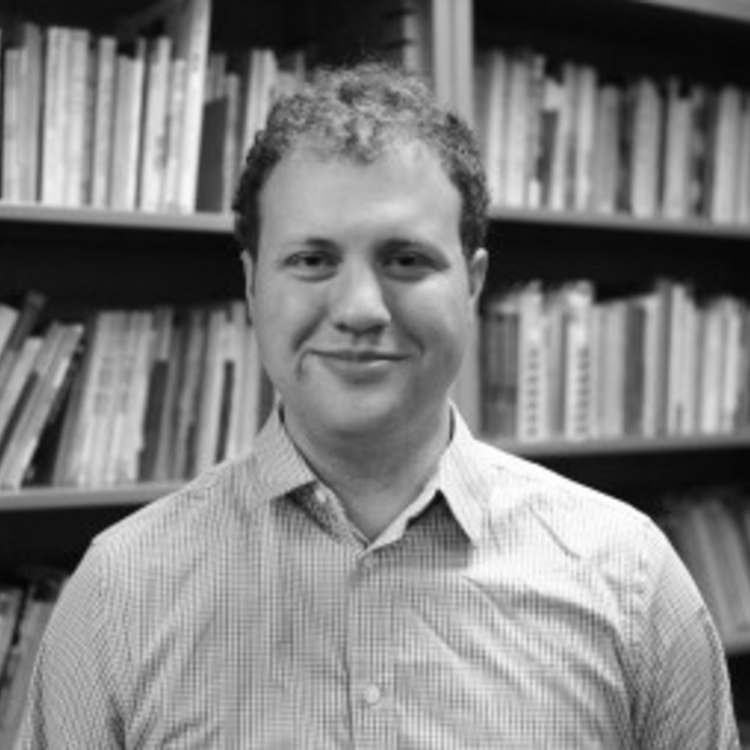
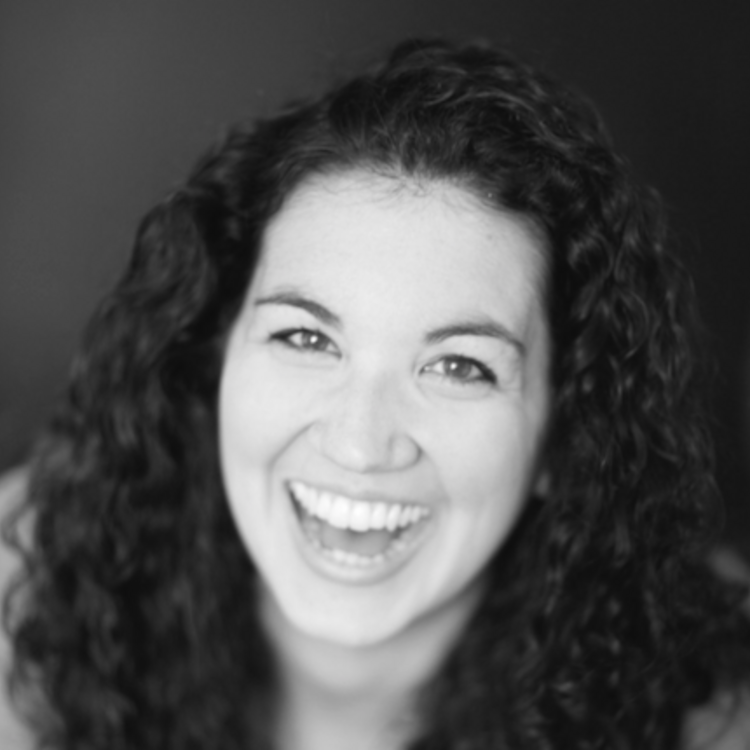

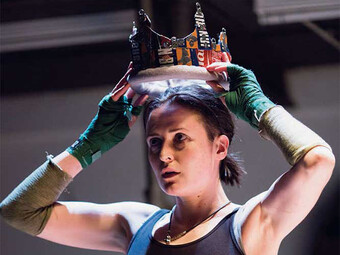




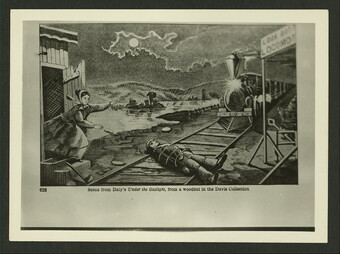

Comments
The article is just the start of the conversation—we want to know what you think about this subject, too! HowlRound is a space for knowledge-sharing, and we welcome spirited, thoughtful, and on-topic dialogue. Find our full comments policy here